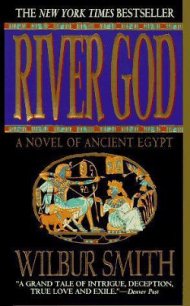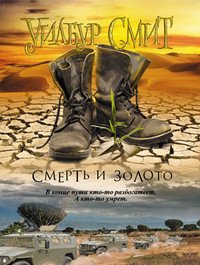Men of Men - Smith Wilbur (онлайн книга без txt) 📗
"This would be a fitting tomb for a king," said Lobengula reflectively, and Gandang could not answer him.
They were silent for a long while.
"I am a dead man," said Lobengula at last, and raised a graceful hand to still Gandang's protest. "I walk, I speak still, but my heart is dead within me."
Gandang was silent, and he could not look upon the king's face.
"Gandang, my brother. I want only peace. Will you grant me that?
When I order it, will you bring your spear to me and by piercing my dead heart let my spirit free to find that peace?"
"My King, my brother, never once have I disobeyed your order. Ever your word was the centre of my existence. Ask anything of me, my brother, anything but this.
Never can I lift my hand towards you, son of Mzilikazi, my father, grandson of Mashobane, my grandfather."
Lobengula sighed. "Oh Gandang, I am so weary and sick with grief.
If you will not give me surcease, then will you send for my senior witchdoctor?"
The witchdoctor came and listened gravely to the king's command; then he rose and went to the carcass of the leopard.
He clipped off the long, stiff, white whiskers and burned them to powder in a tiny clay pot over a small fire. To make the potion stronger still, he pounded a dozen seeds of the poison rope shrub to a paste and mixed it with the lethal ashes. Then from a stoppered buck-horn on his belt, he poured and stirred an acrid green liquid.
On his knees, with face to the ground, he wriggled towards the king like an obsequious cur-dog and placed the pot on the rocky ledge before him. As his withered claw-like fingers released the deadly vessel, Gandang rose silently behind him and drove his assegai between the witchdoctor's bony shoulder blades and out of his pigeon chest.
Then he picked up the wizened skeletal body and carried it into the recesses of the cavern. When he came back he knelt again before Lobengula.
"You are right," Lobengula nodded. "No man but you should know the manner of the king's going."
He picked up the pot and held it between his cupped pink palms.
"Now you will be the father of my poor people. Stay in peace, my brother," said Lobengula, and lifted the pot to his lips and drained it at a single draught.
Then he lay back on the litter and pulled a fur kaross over his head.
"Go sweetly, my beloved brother," said Gandang. His noble features were set like weathered granite, but as he sat beside the king's bier the tears coursed down his cheeks and wet the great battle-scarred muscles of his chest. They buried Lobengula in the cavern, sitting upright on the stone floor and wrapped in the wet green skin of the leopard. They dismantled his wagons and carried them up the hill and stacked the parts at the back of the cave.
They piled Lobengula's tusks of yellow ivory at each hand, and at his feet Gandang placed his toy spear of kingship and his beer pots and eating plates, his knives and mirrors and snuff-horn, his beads and ornaments, a bag of salt and another of grain for the journey, and finally the little sealed clay pots of uncut diamonds to pay his way into the spirit world of his forefathers.
Under Gandang's supervision, they sealed the mouth of the cavern with heavy slabs of black ironstone, then, dolefully singing the king's praises, they went back down the hill.
There were no cattle to slaughter for the funeral feast, nor grain for the beer pots. Gandang called the leaders of the mourning people to him.
"A mountain has fallen," he said simply. "And an age is past. I have left behind me my wife and my son and the land that I loved. Without those things a man is nothing. I am going back. No man need follow me. Each must choose his own path, but mine is south again to Gubulawayo and the magical hills of the Matopos, to meet and talk with this man Lodzi."
In the morning, when Gandang started southwards again, he looked back and saw what was left of the Matabele nation straggling along behind him, no longer a great and warlike people, but a bewildered and broken rabble.
Robyn Codrington stood on the cool shaded verandah of Khami Mission. It had rained that morning, and the air was washed sparkling clean and the wet earth smelled like newly baked bread as the bright sunshine warmed it.
Robyn wore the black ribbons of mourning sewn on her sleeves.
"Why do you come here?" she demanded quietly, but unsmilingly, of the man who mounted the front steps of the verandah.
"I had no choice," Mungo Sint John answered her. He stopped on the top step, and studied her for a moment without any trace of mockery on his face.
Her skin was scrubbed and fresh, devoid of either rouge or powder.
It was smooth and fine-textured. There was no pouching below her clear green eyes, no blurring of her jawline, and her hair drawn back from her temples and forehead was innocent of silver lacing. Her body was small-breasted and narrow-hipped, tall and supple, but when she saw the direction of his gaze, the line of Robyn's lips hardened and set.
"I should be grateful, sir, if you would state your business and leave."
"Robyn, I am sorry, but perhaps it is best that the uncertainty is over."
In the four months since the return of @ the flying column from the Shangani, a dozen rumours. had come out of the bush.
That fateful morning, Mungo Sint John's column, cut off by the flooded river, had heard heavy firing on the opposite bank. Then almost immediately they had themselves come under fierce attack by elements of the Matabele army. They had been forced to retire, a long weary fighting retreat in the rain that had taken weeks of starvation and privation, until at last the harrying impis had let them go, but not before the gun carriages had been abandoned and half the horses lost.
Nobody had known what had happened to Allan Wilson's patrol on the north bank of the Shangani, but then the word had reached Gubulawayo that the little band had cut their way through the impis, gained the Zambezi, and rafted down it to the Portuguese settlement of Tete, three hundred miles downstream. Later that was denied by the Portuguese and hopes plunged, to be revived again when a Matabele induna coming in to surrender suggested that the white men had been taken prisoner by the Inyati regiment, rumour, denial and counter-rumour for four harrowing months, and now Mungo Sint John was standing before Robyn.
"It's certain," he said. "I did not want a stranger to bring the news to you."
"They are dead," she said flatly.
"All of them. Dawson reached the battlefield and found them."
"He would not have been able to recognize them or be certain of how many bodies. Not after all these months, not after the hyena and vultures, "
"Robyn, please." Mungo held out a hand to her, but she recoiled from him.
"I won't believe it, Clinton could have escaped."
"In the bush Dawson met the senior induna of the Matabele. He is coming in with all his people to surrender. He described to Dawson the patrol's last stand, and how in the end they all died."
"Clinton could have, " She was very pale, shaking her head firmly.
"Robyn, it was Gandang. He knew your husband-well.
"Hlopi" he called him, the man with white hair. He saw him lying with the other dead. It is certain. There can be no more hope."
"You can go now," she said, and then quite suddenly she was weeping. Standing very erect and chewing her lower lip to try and stop herself, but her face had crumpled and the rims of her eyelids turned rosy-pink with grief.
"I cannot leave you like this," he said and limped down the stoep towards her.




